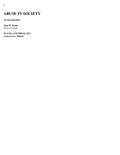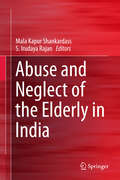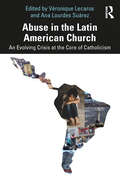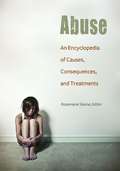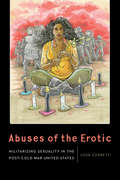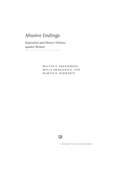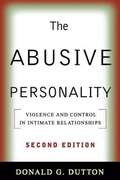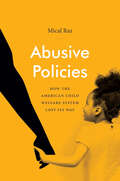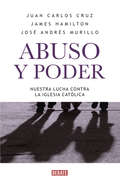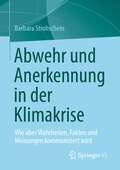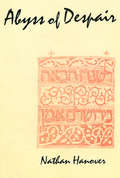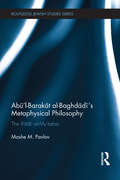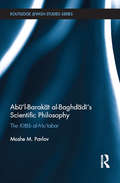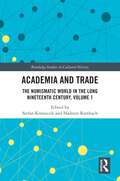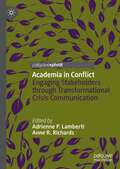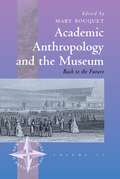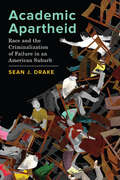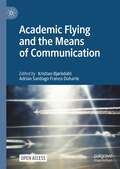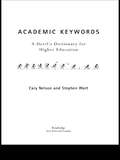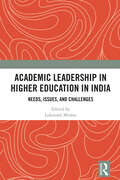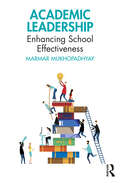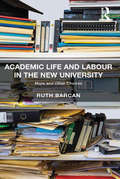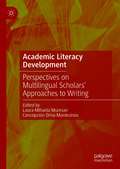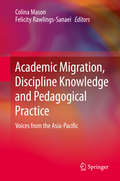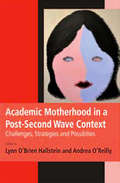- Table View
- List View
Abuse In Society: An Introduction
by Alan R. KempToday's headlines are filled with increasingly alarming accounts of abuse by coaches, religious leaders, institutional caregivers, family members, and others. Abuse in Society provides an illuminating and timely introduction to the physical, emotional/psychological, and sexual faces of abuse. The text presents a much-needed, in-depth assessment of child maltreatment, intimate partner violence, abuse by clergy, abuse of the elderly and disabled, and abuse in sports. Among the specific problems covered are bullying and sibling abuse, courtship violence and date rape, and abuse in the relationships of sexual minorities. The author explores these complex issues using an ecological approach, examining interacting explanations from a variety of perspectives and levels of analysis: societal and cultural, family, and individual.
Abuse and Neglect of the Elderly in India
by S. Irudaya Rajan Mala Kapur ShankardassThis book highlights different aspects of the problem of elder abuse and neglect in India, and discusses its forms as well as means of prevention, intervention and management. It presents a framework for understanding the occurrence of elder abuse and neglect in India, placing the discussion within the global context. Elder abuse and neglect is a growing concern in South Asia, and this is the first comprehensive account of the topic from India. It uses data from different parts of India to describe the various dimensions of elder abuse and neglect among different population categories and sections in society. Covering rural and urban areas in different states, it discusses current perspectives on elder abuse and neglect at the household level, widows, HIV-affected populations, and those residing in institutions. This book comprises views from experts in the field and is of interest to researchers and academics from the social and behavioural sciences, policy makers, and NGOs.
Abuse in the Latin American Church: An Evolving Crisis at the Core of Catholicism
by Véronique Lecaros Ana Lourdes SuárezThis book addresses the crisis of sexual abuse in the Roman Catholic Church in Latin America, the region of the world with the highest percentage of Catholics. Bringing together research from across the continent, it demonstrates that abuse within the Church is indeed a global phenomenon, though abuses have taken different forms according to varying sociocultural contexts. With attention to abuses committed against children, women and vulnerable adults – by both men and women – within the settings of parishes, new religious movements and international religious organizations, it also raises questions of justice, asking how to assess the suffering of victims, how to deal with abusers and how to prevent abuses. It will therefore be of interest to scholars of religious studies, sociology, Latin American studies, criminology, theology, and religious leaders with interests in the abuses and scandals that have been revealed in the worldwide Church.
Abuse: An Encyclopedia Of Causes, Consequences, And Treatments
by Rosemarie SkaineAbuse, a key theme of health education curricula, is also a major issue faced by many segments of society. Intended for high school students as well as undergraduates and the general reader, this comprehensive encyclopedia explores abuse in all its forms--physical, sexual, emotional, and verbal--among a variety of age and demographic groups from children to the elderly to the disabled. It sheds light on causes and symptoms of abuse, examines lasting impacts, and suggests avenues for prevention and treatment. <P><P> Specific topics of concern to a secondary school audience include bullying and cyberbullying; abuse of those in same-sex relationships; and sexual abuse through rape, date rape, incest, and sexting. Elder abuse, which has become of greater concern as our society ages, is covered, as are domestic abuse, child abuse, and abduction. Through up-to-date entries by expert contributors, readers will learn about the causes and results of specific types of abuse, as well as their legal and sociological dimensions. The title will also serve as a gateway to further study--and as a resource for readers seeking help.
Abuses of the Erotic: Militarizing Sexuality in the Post-Cold War United States (Expanding Frontiers: Interdisciplinary Approaches to Studies of Women, Gender, and Sexuality)
by Josh CerrettiEvents ranging from sexual abuse at Abu Ghraib to the end of “Don’t Ask, Don’t Tell” hint that important issues surrounding gender and sexuality remain at the core of political and cultural problems. Nonetheless, intersectional analyses of militarism that account for questions of race, class, and gender remain exceedingly rare. Abuses of the Erotic fills this gap by offering a comprehensive picture of how military values have permeated the civilian cultural sphere and by investigating connections between sexuality and militarism in the United States since the late 1980s. Josh Cerretti takes up the urgent task of applying an interdisciplinary, transnational framework to the role of sexuality in promoting, expanding, and sustaining the war on terror to understand the links between what Cerretti calls “domestic militarism” and later projects of state-backed violence and intervention. This work brings together scholarship on domestic and international militarization in relation to both homosexuality and heterosexuality to demonstrate how sexual and gender politics have been deployed to bolster U.S. military policies and, by tracking over a decade of militarized sexuality, how these instances have foundationally changed how we think of sexual and gender politics today.
Abusive Endings: Separation and Divorce Violence against Women
by Martin D. Schwartz Walter S. Dekeseredy Molly DragiewiczAbusive Endings offers a thorough analysis of the social-science literature on one of the most significant threats to the health and well-being of women today—abuse at the hands of their male partners. The authors provide a moving description of why and how men abuse women in myriad ways during and after a separation or divorce. The material is punctuated with the stories and voices of both perpetrators and survivors of abuse, as told to the authors over many years of fieldwork. Written in a highly readable fashion, this book will be a useful resource for researchers, practitioners, activists, and policy makers.
Abusive Personality, Second Edition
by K. O'Leary Donald DuttonThis influential book provides an innovative framework for understanding and treating intimate partner violence. Integrating a variety of theoretical and empirical perspectives, Donald G. Dutton demonstrates that male abusiveness is more than just a learned pattern of behavior--it is the outgrowth of a particular personality configuration. He illuminates the development of the abusive personality from early childhood to adulthood and presents an evidence-based treatment approach designed to meet this population's unique needs. The second edition features two new chapters on the neurobiological roots of abusive behavior and the development of abusiveness in females.
Abusive Policies: How the American Child Welfare System Lost Its Way (Studies in Social Medicine)
by Mical RazIn the early 1970s, a new wave of public service announcements urged parents to "help end an American tradition" of child abuse. The message, relayed repeatedly over television and radio, urged abusive parents to seek help. Support groups for parents, including Parents Anonymous, proliferated across the country to deal with the seemingly burgeoning crisis. At the same time, an ever-increasing number of abused children were reported to child welfare agencies, due in part to an expansion of mandatory reporting laws and the creation of reporting hotlines across the nation. Here, Mical Raz examines this history of child abuse policy and charts how it changed since the late 1960s, specifically taking into account the frequency with which agencies removed African American children from their homes and placed them in foster care. Highlighting the rise of Parents Anonymous and connecting their activism to the sexual abuse moral panic that swept the country in the 1980s, Raz argues that these panics and policies—as well as biased viewpoints regarding race, class, and gender—played a powerful role shaping perceptions of child abuse. These perceptions were often directly at odds with the available data and disproportionately targeted poor African American families above others.
Abuso y poder: Nuestra lucha contra la Iglesia Católica
by James Hamilton Juan Carlos Cruz JOSE MURILLOLa historia de un largo proceso de búsqueda de justicia por parte de tres víctimas del caso Karadima Desde que el Caso Karadima se transformara en uno de los más significativos casos de abuso en la iglesia chilena, el camino que han seguido tres de sus víctimas ha estado rodeado de dificultades. Sin embargo, desde que el papa Francisco los recibiera en el Vaticano, ocho años después, esa historia (y la historia de la iglesia chilena) ha tenido un giro orientado a la búsqueda de reparación por los daños causados. Esta es su historia.
Abwehr und Anerkennung in der Klimakrise: Wie über Wahrheiten, Fakten und Meinungen kommuniziert wird
by Barbara StrohscheinAuf Wahrheiten, Fakten und Meinungen zur Klimafrage wird häufig öffentlich wie privat mit psychischer oder sozialer Abwehr reagiert. Gestützt auf ausgewählte psychologische und philosophische Theorien sowie Datenmaterial wird in diesem Buch gezeigt, wie Abwehr zustande kommt, wie sie wirkt und wie andererseits die notwendige Anerkennung auf verschiedenen Ebenen gelingen kann. Erst durch Anerkennung werden konstruktive Diskurse möglich. Dieses Buch bietet alle Grundlagen, um Kommunikationskonflikte zwischen Abwehr und Anerkennung in der Klimakrise theoretisch und praktisch lösen zu können.
Abyss of Despair
by Nathan HanoverProviding a gripping, first-hand account of the Chmielnicki massacres in 1648-58, in which tens of thousands of Jews perished in Poland and the Ukraine, Rabbi Nathan Hanover describes the events themselves and their effect on European Jewry. Hanover's description of the atrocities commited* by Chmielnicki and his hordes makes it clear that they set the precedent for Hitler's torture chambers. Hanover's account of the events understood in their historical context 'shows how humans can transcend tragedy and rebuild their lives, developing new ways to express their heritage and culture. Professor Helmreich, in his new introduction, describes the- period of relative peace and prosperity for the Jews immediately preceding the massacres. He traces some of the important effects the massacre had on later Jewish history, such as the rise of Messianic and Hasidic movements in the seventeenth and eighteenth centuries and the migration of Jews back toward the west, where they were situated when the Enlightenment swept through Europe.
Abū’l-Barakāt al-Baghdādī’s Metaphysical Philosophy: The Kitāb al-Mu‘tabar (Routledge Jewish Studies Series)
by Moshe M PavlovAbū’l-Barakāt is a renowned philosopher of the Arabic-Jewish milieu who composed in his magnum opus the Kitāb al-Mu‘tabar, a comprehensive metaphysics which challenged the accepted notions of the traditional metaphysical philosophy. ‘Abū’l-Barakāt al-Baghdādī’s Metaphysical Philosophy’ examines the novel philosophical conceptions of the first book of the Metaphysics of the Kitāb al-Mu‘tabar. The aim is to present a developed conception of Abū’l-Barakāt’s systematic metaphysics. This is accomplished by following the order of topics discussed, while translating the relevant passages. These different topics comprise stages of cognition that move from an analysis of time, creation and causality to the conception of a higher spiritual realm of mental entities and a conception of God as the First Knower and Teacher. The epistemological and ontological conceptions are analyzed at each culminating stage. ‘Abū’l-Barakāt al-Baghdādī’s Metaphysical Philosophy’ analyzes vast portions of the metaphysical study for the first time. The book will thus be a valuable resource for all those seeking an original and broad metaphysics, and for students and scholars of Jewish and Islamic Philosophy. Furthermore, it is of importance for those seeking a metaphysics related to scientific theories and those interested in the history of science and metaphysics.
Abū’l-Barakāt al-Baghdādī’s Scientific Philosophy: The Kitāb al-Mu‘tabar (Routledge Jewish Studies Series)
by Moshe M. PavlovAbū’l-Barakāt is often considered one of the most comprehensive philosophers of the Arabic-Jewish milieu in the medieval age. His extensive and unique philosophical theories, especially his theories in the particular sciences, were seen as a major challenge for the traditional conceptions of the Aristotelian school of thought during and after this period. ‘Abū’l-Barakāt al-Baghdādī’s Scientific Philosophy’ explores the core material of Abū’l-Barakāt’s scientific studies, found in his magnum opus the Kitāb al-Mu‘tabar. The book then locates these scientific theories within Abū’l-Barakāt’s philosophy more widely. Whilst providing a comprehensive critique of ancient philosophy, including the work of Aristotle, certain affinities between Abū’l-Barakāt’s work and that of more modern scientific conceptions are also examined. Containing vast amounts of previously untranslated text, ‘Abū’l-Barakāt al-Baghdādī’s Scientific Philosophy’ sheds new light on the philosopher’s scientific theories, particularly with regards to his logical conceptions. For this reason, the book will be a valuable resource for students and scholars of Jewish and Islamic Philosophy, whilst the scientific material will appeal to those studying the history of science.
Academia and Trade: The Numismatic World in the Long Nineteenth Century, Volume 1 (Routledge Studies in Cultural History)
by Stefan Krmnicek Hadrien RambachThis first part of a 2-volume collection comprises a collection of essays in English by leading scholars on the 19th-century Academia and Trade presenting the latest developments in international scholarship on the numismatic world in the long 19th century. In the 19th century, developments in the study and collection of coins set the cornerstone for modern numismatics. This volume comprises a collection of essays in English by international leading scholars that highlight significant figures of the 19th-century research and the state of the numismatic trade in their time. Centering around collectors and scholars of ancient, medieval, and modern numismatics, and on non-Western coinage and medals against the backdrop of the political, cultural, economic, and social changes of the era, this book presents the latest scholarship on numismatics’ contribution to the cultural history of the 19th century. This volume is essential for students and scholars alike interested in 19th -century history and the history of coins.
Academia in Conflict: Engaging Stakeholders through Transformational Crisis Communication
by Anne R. Richards Adrienne P. LambertiThis book explores communication as a key influence on the trajectory of conflicts and crises in the specific context of academia. From the ideological responsibilities of academia to the profit-seeking motives of institutions, the authors explore challenges facing faculty across multiple disciplines. Critique of the higher education industry is more necessary than ever in the context of academic corporatization and marketization. Academia in Conflict reveals how institutional discourses can contribute to or mitigate conflict and crisis, offering communication practices that prioritize stakeholder experiences and needs. Enduring academic crises are addressed, including declines in public funding, mental health emergencies, and threats to job stability. Academia in Conflict provides crucial insights for navigating the challenges of higher education today.
Academic Anthropology and the Museum
by Mary BouquetThere is ample evidence that anthropologists are among those whose imaginations have been fired by the museum, over the past fifteen to twenty years.
Academic Apartheid: Race and the Criminalization of Failure in an American Suburb
by Sean J. DrakeIn Academic Apartheid, sociologist Sean J. Drake addresses long-standing problems of educational inequality from a nuanced perspective, looking at how race and class intersect to affect modern school segregation. Drawing on more than two years of ethnographic observation and dozens of interviews at two distinct high schools in a racially diverse Southern California suburb, Drake unveils hidden institutional mechanisms that lead to the overt segregation and symbolic criminalization of Black, Latinx, and lower-income students who struggle academically. His work illuminates how institutional definitions of success contribute to school segregation, how institutional actors leverage those definitions to justify inequality, and the ways in which local immigrant groups use their ethnic resources to succeed. Academic Apartheid represents a new way forward for scholars whose work sits at the intersection of education, race and ethnicity, class, and immigration.
Academic Flying and the Means of Communication
by Kristian Bjørkdahl Adrian Santiago Franco DuharteThis open access book shines a light on how and why academic work became entwined with air travel, and what can be done to change academia’s flying habit. The starting point of the book is that flying is only one means of scholarly communication among many, and that the state of the planet now obliges us to shift to other means. How can the academic-as-globetrotter become a thing of the past? The chapters in this book respond to this call in three steps. It documents the consequences of academic flying, it investigates the issue of why academics fly, and it begins an effort to think through what can replace flying, and how. Finally, it confronts scholars and scientists, students, activists, research funders, university administrators, and others, with a call to translate this research into action.
Academic Keywords: A Devil's Dictionary for Higher Education
by Cary Nelson Stephen WattKnow what academic freedom is? Or what it's come to mean? What's affirmative about affirmative action these days? Think you're up on the problem of sexual harassment on campus? Or know how much the university depends on part-time faculty? Academic Keywords is a witty, informed, and sometimes merciless assessment of today's campus, an increasingly corporatized institution that may have bitten off more than its administration is ready to chew. Cary Nelson and Steve Watt use the format of a dictionary to present stories and reflections on some of the most pressing issues affecting higher education in America. From the haphazard treatment of graduate students to the use and abuse of faculty (as well as abuses commited by faculty), Nelson and Watt present a compelling and, at times, enraging report on the state of the campus.
Academic Leadership in Higher Education in India: Needs, Issues, and Challenges
by Lokanath MishraThis volume focuses on the need to establish good leadership in academic settings and higher education institutions in India. It provides an understanding of the higher education system, knowledge, skills, and experience required for better leadership and management of academic institutions. The book highlights the importance of practising data-driven decision making for leaders of dynamic organizations within a complex social, political, and economic environment. It explores how a systematic leadership programme needs to be developed to ensure academic leadership effectiveness. While discussing federal and state systems of higher education, policies and regulations, key leadership strategies for improved institutional performance and better institutional governance, the volume outlines how effective academic leadership helps in building teams, nurturing staff, strengthening alliances, developing research capacity and strategic planning, and renewing academic programmes.This volume will be of interest to teachers, students, and researchers of education, higher education, management education, and political economy. It will also be useful for academicians, policy makers, management leaders, and academic leaders.
Academic Leadership: Enhancing School Effectiveness
by Marmar MukhopadhyayThis book provides contemporary knowledge on school effectiveness and proposes strategic interventions for enhancing it. It focuses on improving academic leadership for enhancing the effectiveness of schools and discusses how national education policies are helpful in providing a vision towards improving school effectiveness. It highlights the role of teachers as academic leaders in the implementation of policy recommendations at school and classroom levels. It offers methods and mechanisms for academic leaders to measure the learning of students for school assessment. The author also discusses how academic leadership involves creating a vision and mission based on science and research data for the organisation, inspiring innovation and creative ideas, developing teamwork, and a safe environment for staff to express their views. While providing an understanding of school as an organization, the volume outlines its management functions such as processes and quality of planning, management of curriculum, learner evaluation, institutional networks, and human resource management, among others. The volume is a guidebook for training and capacity building for school-level practitioners and leaders in education management. Embedded with real-life cases and episodes, this volume will be of interest to teachers, students, and practitioners of education, management, and education management. It will also be useful for academicians, educationalists, practitioners, management professionals, educational leaders, and policymakers.
Academic Life and Labour in the New University: Hope and Other Choices
by Ruth BarcanWhat does it mean to be an academic today? What kinds of experiences do students have, and how are they affected by what they learn? Why do so many students and their teachers feel like frauds? Can we learn to teach and research in ways that foster hope and deflate pretension? Academic Life and Labour in the New University: Hope and Other Choices addresses these big questions, discussing the challenges of teaching and researching in the contemporary university, the purpose of research and its fundamental value, and the role of the academy against the background of major changes to nature of the university itself. Drawing on a range of international media sources, political discourse and many years’ professional experience, this volume explores approaches to teaching and research, with special emphasis on the importance of collegiality, intellectual honesty and courage. With attention to the intersection of large-scale institutional changes and intellectual shifts such as the rise of transdisciplinarity and the development of a pluralist curriculum, this book proposes the pursuit of more ethical, compassionate and critical forms of teaching and research. As such, it will be of interest not only to scholars of cultural studies and education, but to all those who care about the fate of the university as an institution, including young scholars seeking to join the academy.
Academic Literacy Development: Perspectives on Multilingual Scholars' Approaches to Writing
by Laura-Mihaela Muresan Concepción Orna-MontesinosThis edited book brings together an international cast of contributors to examine how academic literacy is learned and mastered in different tertiary education settings around the world. Bringing to the fore the value of qualitative enquiry through ethnographic methods, the authors illustrate in-depth descriptions of genre knowledge and academic literacy development in first and second language writing. All of the data presented in the chapters are original, as well as innovative in the field in terms of content and scope, and thought-provoking regarding theoretical, methodological and educational approaches. The contributions are also representative of both novice and advanced academic writing experiences, providing further insights into different stages of academic literacy development throughout the career-span of a researcher. Set against the backdrop of internationalisation trends in Higher Education and the pressure on multilingual academics to publish their research outcomes in English, this volume will be of use to academics and practitioners interested in the fields of Languages for Academic Purposes, Applied Linguistics, Literacy Skills, Genre Analysis and Acquisition and Language Education.
Academic Migration, Discipline Knowledge and Pedagogical Practice: Voices from the Asia-Pacific
by Colina Mason Felicity Rawlings-SanaeiThis volume makes a distinctive and innovative contribution to the globalisation of higher education literature by highlighting the myriad benefits of academic migration. Sixteen academic migrants across the Asia-Pacific region reflect on their experiences and wisdom gained across geographical, cultural and disciplinary domains. Each one provides an authentic account of ways in which their experiences and insights have benefited their host institutions and enhanced their pedagogical practice. The groundbreaking volume calls for a shift in academic culture - one in which academic migrants are respected for their cultural, social and intellectual resources, their enhanced interpretive ability and their capacity to view the world through multiple lenses. Are these not the characteristics of educators which universities seek in their efforts to internationalise their institutions and develop in their students an understanding of global citizenship? The volume forges new territory in articulating the relationship between academic migrants, conceptual understanding and the construction of knowledge. The following themes are addressed in this book: Migration of Ideas, Conceptual Understanding and Pedagogical Enrichment Indigenous Pedagogies and Bridging Worldviews Changing Academic Identities and Reshaping Pedagogies Teaching Practice and the Academic Diaspora.
Academic Motherhood in a Post Second Wave Context
by Hallstein Lynn O'BrienContributors detail what it means to be an academic mother and to think about academic motherhood, while also exploring both the personal and specific institutional challenges academic women face, the multifaceted strategies different academic women are implementing to manage those challenges, and investigating different theoretical possibilities for how we think about academic motherhood.
